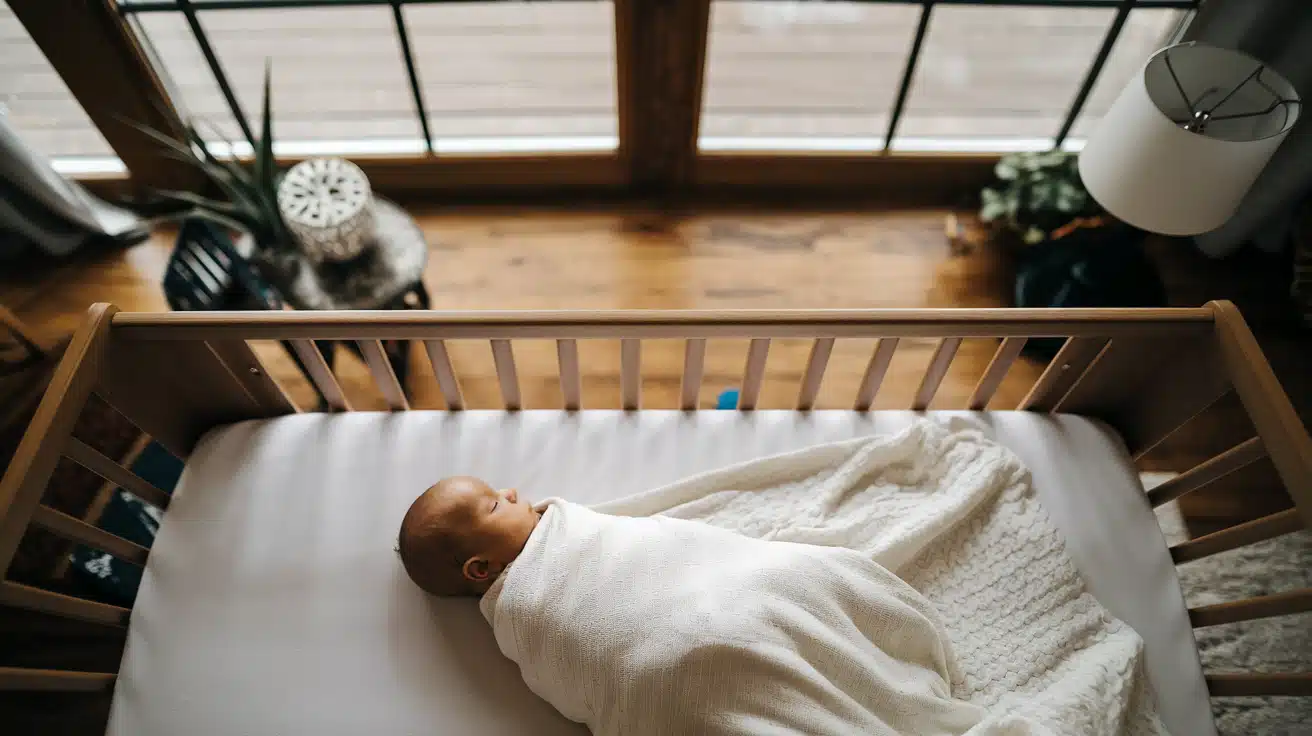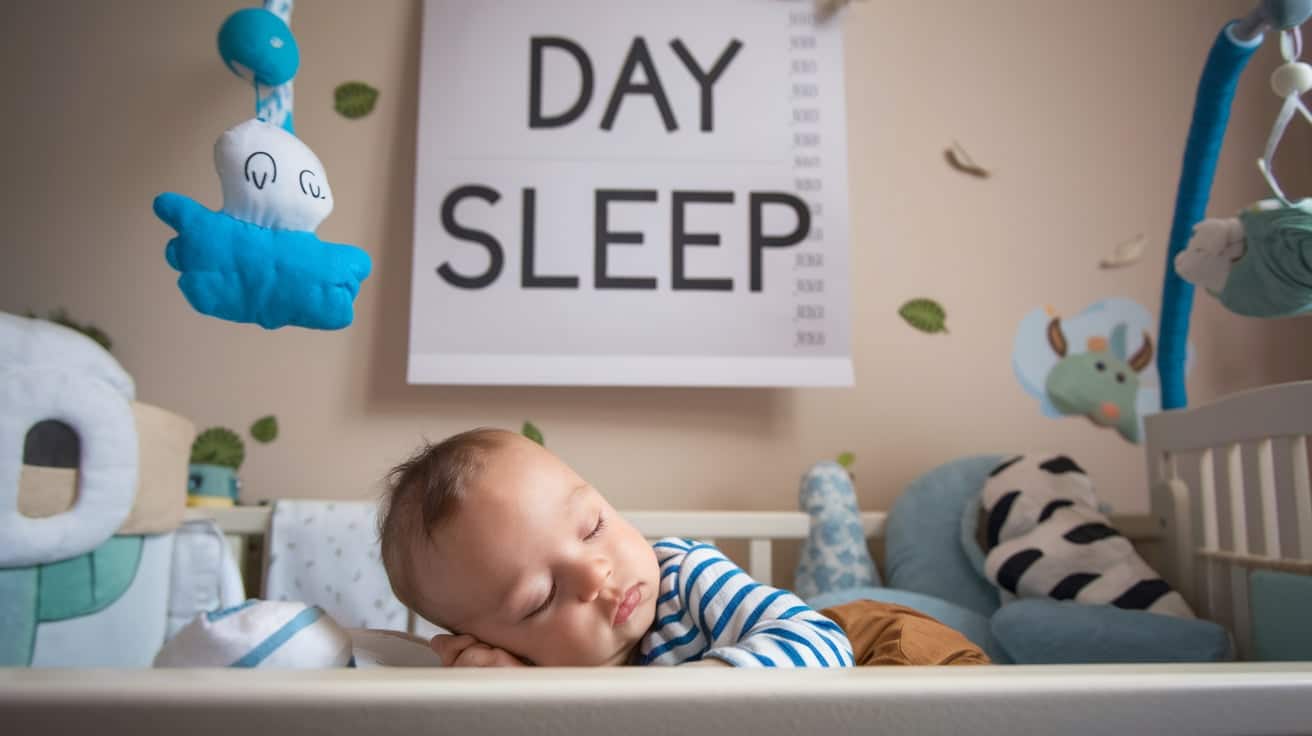Does your baby sleep too much during the day? Well, this question has helped many worried parents figure this out.
While babies need lots of daytime sleep, too much of it can mess up their nighttime rest and growth patterns.
We know how hard it is to tell what’s normal and what’s not when it comes to baby sleep.
But don’t worry! You’re not alone in this, and we’re here to make things clearer for you.
In this post, we’ll show you the key signs that tell you if your baby is sleeping more than they should during the day, plus what you can do about it.
What is Excessive Daytime Sleep in Babies?
As pediatric sleep experts, we always explain this in the simplest way possible. Think of your baby’s daytime sleep on a carefully balanced scale. Too little sleep isn’t good, but too much isn’t ideal either.
Your baby sleeps too much during the day when they get more sleep than what’s right for their age. We often see this when babies nap for unusually long periods that go beyond their usual sleep needs.
Here’s what we mean by “too much“:
- Your baby naps longer than two hours at a time
- They fall asleep again right after waking up
- They sleep so much during the day that it affects their night sleep
According to us, babies who sleep too much during daytime hours often have trouble sleeping at night. This creates a cycle that can be tough on both babies and parents.
Every baby has their own sleep patterns, but there are general guidelines we can look at to spot when daytime sleep becomes excessive.
Common Signs of Excessive Daytime Sleep
We’ve spent years helping parents spot sleep issues in babies.
Let me share the most common signs we see when babies sleep too much during the day.
1. Difficulty Waking Up
- Your baby is hard to wake up from naps
- They seem tired even after sleeping for long periods
- You need to wake them multiple times before they stay awake
2. Unusual Sleep Duration
- Your baby naps for more than 2-3 hours at once
- They sleep through their regular feeding times
- Daytime sleep takes up most of their active hours
3. Changes in Nighttime Sleep
- Your baby has trouble falling asleep at their usual bedtime
- They wake up more often during the night
- Morning wake-up times become later than normal
4. Feeding Pattern Changes
- Your baby misses their regular feeding times
- They seem less interested in milk or food
- You need to wake them up to feed
5. Mood and Behavior Changes
- Your baby seems less active when awake
- They show less interest in playing
- They’re fussy and cranky despite sleeping a lot
6. Development Concerns
- Your baby misses chances to learn new skills
- They have fewer alert periods for social interaction
- Daily activities and routines become harder to establish
We always tell parents to trust their gut. If you notice several of these signs, it’s worth talking about them with your baby’s doctor.
Certain Possible Causes of Excessive Daytime Sleep
Medical Reasons
- A growth spurt that needs extra rest
- Fighting off a mild illness or getting over being sick
- Recent vaccinations that make babies sleepier
- Medications that might cause drowsiness
Environmental Factors
- Room temperature that’s too warm
- Not enough light during the day
- Too much quiet or white noise
- A sleeping space that’s too cozy
Schedule-Related Issues
- Missing their natural sleep windows
- Going to bed too late at night
- Irregular nap patterns
- Too many short naps instead of good long ones
Diet and Feeding
- Not getting enough to eat during awake times
- Gaps between feeding sessions that are too long
- Changes in feeding patterns
- Taking in less food than they need
Daily Activity Levels
- Not enough tummy time when awake
- Limited exposure to natural daylight
- Too little physical movement during awake periods
- Not enough play time between naps
We want you to know that most common causes are temporary and can be fixed with small changes to your baby’s routine.
If you’re worried, writing down your baby’s sleep patterns for a few days can help spot the real cause.
Time Frame When You Might Need to Wake Your Baby
We know it feels wrong to wake a sleeping baby – we hear this from parents all the time!
But sometimes, it’s needed to keep your baby healthy and their sleep schedule on track.
Let me share when and how to do this.
1. When to Wake Your Baby
For Feeding Needs
- If your baby sleeps through feeding times
- When they need to gain weight
- If they’re missing too many daytime feeds
- During the first few weeks, to maintain milk supply
For Schedule Management
- When naps go longer than 2.5 hours
- If late afternoon naps will affect bedtime
- To protect night sleep
- When morning wake times vary too much
For Health Checks
- After getting a new medicine
- During illness and given fluids
- When monitoring temperature
- Following doctor’s instructions
2. How to Wake Your Baby Gently
Start with Light
- Open the curtains slowly
- Let natural light into the room
- Turn on a soft lamp
- Create a bright environment
Use Touch and Sound
- Stroke their cheeks softly
- Gently move their arms or legs
- Speak in a quiet, happy voice
- Sing a favorite song
Make it Gradual
- Give them a minute to stir
- Change their diaper
- Move them to a sitting position
- Keep the room warm
3. After Waking
- Stay with them until they’re fully awake
- Offer a feed right away
- Move to a well-lit area
- Start an activity they like
Remember: Waking your baby isn’t mean – sometimes it’s the kind of thing to do for their health and sleep routine.
If you’re unsure about waking your baby, talk to your pediatrician about what’s best for your situation.
How Too Much Day Sleep Can Impact Night Sleep
Sleep Bank Gets Too Full
- Your baby has a daily sleep need
- Extra daytime sleep uses up this need
- Less tiredness remains for night’s sleep
- Baby becomes restless at bedtime
Sleep Cycle Changes
- Natural sleep patterns get disrupted
- Your baby may wake up more at night
- Morning wake-up times become random
- Regular bedtimes become harder to keep
Feeding Gets Off-Track
- Baby misses important daytime feeds
- They might need more night feeds
- This creates a cycle of night-waking
- Daytime eating patterns suffer
Energy Levels Get Mixed Up
- Baby saves energy during the day
- They become more active at night
- Less tired when bedtime comes
- It takes longer to settle down
Day-Night Confusion
- Baby loses sense of day and night
- They might think night is playtime
- Daytime becomes naptime
- Sleep schedule gets reversed
A Day Sleep Chart By Age to Prefer
Let me share a helpful sleep chart we use with parents in our practice.
This chart shows normal sleep ranges – if your baby sleeps more than these times, you might want to make some changes.
Newborn (0-3 Months)
- Total daytime sleep: 4-6 hours
- Number of naps: 4-5 naps
- Length per nap: 30 minutes to 2 hours
- Signs of too much: More than 7 hours of total daytime sleep
Young Babies (3-6 Months)
- Total daytime sleep: 3-4 hours
- Number of naps: 3-4 naps
- Length per nap: 45 minutes to 2 hours
- Signs of too much: More than 5 hours of total daytime sleep
Older Babies (6-9 Months)
- Total daytime sleep: 2-3 hours
- Number of naps: 2-3 naps
- Length per nap: 1 to 2 hours
- Signs of too much: More than 4 hours of total daytime sleep
Crawlers (9-12 Months)
- Total daytime sleep: 2-2.5 hours
- Number of naps: 2 naps
- Length per nap: 1 to 1.5 hours
- Signs of too much: More than 3 hours total daytime sleep
Toddlers (12-18 Months)
- Total daytime sleep: 1.5-2 hours
- Number of naps: 1-2 naps
- Length per nap: 1 to 2 hours
- Signs of too much: More than 2.5 hours of total daytime sleep
Remember: These are guidelines, not rules. Some babies need a little more or less sleep. What matters most is how your baby acts when they’re awake.
If they’re happy and meeting their milestones, their sleep amount is likely just right for them.
How to Maintain a Healthy Daytime Sleep Routine
Create a Consistent Wake Time
- Pick a morning wake time that fits your family
- Wake your baby at the same time each day
- Open curtains to let in natural light
- Start with a happy, bright greeting
Set Up the Right Sleep Space
- Keep the room at a good temperature
- Use light-blocking curtains for naps
- Put on soft background sounds
- Make sure the bed or crib is comfy
Watch for Sleep Signs
- Look for eye-rubbing
- Notice when they get quiet
- Pay attention to fussy moments
- Learn your baby’s tired signals
Time Naps Well
- Keep track of awake times
- Start the nap before they get too tired
- Don’t let naps go too long
- Leave time between naps for play
Make a Pre-Nap Pattern
- Change their diaper
- Read a short book
- Give cuddles
- Use the same words or songs
Balance Sleep and Activity
- Plan playtime between naps
- Include outside time when possible
- Do tummy time when they’re most alert
- Mix quiet and active play
Keep Feeding on Track
- Feed when they first wake up
- Make sure they eat enough when awake
- Don’t let them sleep through meals
- Keep a feeding log if needed
What to Do When Plans Change
- Get back to the routine the next day
- Don’t try to make up for missed sleep
- Keep the main wake times the same
- Stay calm if things get off track
Remember: Good sleep habits take time to build. Start with one change at a time, and soon, you’ll have a routine that works for everyone in your family.
Conclusion
Getting your baby’s sleep right isn’t always easy, but now you have the tools to spot and fix daytime sleep issues.
We’ve shared what we’ve learned from helping hundreds of parents – from spotting the signs to fixing sleep routines that are working.
Remember, every baby is different. While the tips and charts we’ve shared can guide you, trust your parental instinct, too.
If something doesn’t feel right about your baby’s sleep, talk to your pediatrician.
Want to start improving your baby’s sleep today?
Begin by tracking their nap times for a week. This simple step will help you spot patterns and make better sleep choices for your little one.
Have questions about your baby’s sleep? Feel free to leave a comment below!
Frequently Asked Questions
How Do I Know if My Baby is Getting Too Much Sleep During the Day?
If your baby is hard to wake up, skips feeds, shows less interest in play, and has trouble sleeping at night, they might sleep too much.
Should I Wake My Baby from a Long Nap?
Yes, wake your baby if they nap more than 2.5 hours. This helps keep their day and night sleep on track and protects feeding times.
What Should I Do if My Baby Falls Asleep Right After Waking Up?
Use bright light, change their diaper, offer food, and start playtime. These simple steps help keep your baby alert after waking up.
















